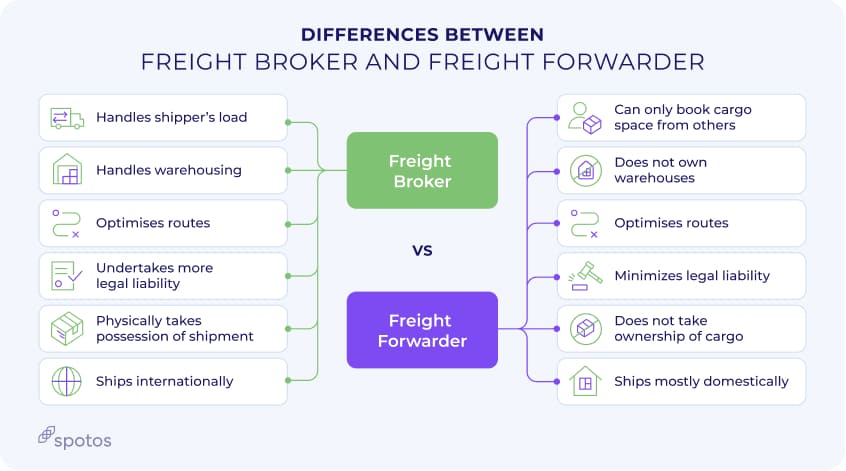Freight brokers and freight forwarders are vital players in the shipping industry. Anyone who wants products delivered anywhere in the world uses at least a freight broker. Picking one can mean getting the needed services and working on complex parts of international shipping. A freight broker and freight forwarder is a solution depending on the specifics of service your business requires.
What is a freight broker?
In the most general sense, a freight broker connects shippers with carriers. Also, freight brokers dealing with:
- Contracts
- Network of international cargo
- Transportation services
Freight broker never takes control of the cargo. They don’t own any trucks or other modes of transportation. They are responsible for distribution operations.
Middleman service for cargo
A freight broker is a middleman service. They earn a commission through each shipment. Also, they have an extensive network of shippers. So carriers are also added to a freight broker’s network. As a result, they give carriers much more work than any individual company ever could.
Efficiency is key
Before a contract is in place, a freight broker negotiates the best rates for both parties. Also, the broker optimizes routes, manages insurance, and often focuses more on domestic freight. After the contract is signed, the freight broker facilitates communication between both parties.
A freight brokerage company manages these responsibilities:
- Dealing with contract details
- Negotiating rates
- Book cargo space between shippers and carriers
- Handle insurance claims
- Oversee transport and delivery
What is a freight forwarder?
A freight forwarder takes care of the entire shipping process through their network. Unlike a broker, it takes physical possession of the shipper’s cargo. They assist importers and exporters throughout the journey. As such, they offer many more services than any broker.
International shipments
The freight forwarder handles international shipments. Their responsibilities include the following:
- Handling cargo and delivering it to the intended destination
- Being the customs broker and manager, preparing customs paperwork
- Handling insurance and other claims
- Route shipment and optimizing delivery times
- Consult clients on the packaging of sensitive goods
- Labelling for international shipping
- Prepare documentation (e.g., bill of lading, commercial invoice, and others)
Use a freight forwarder and relieve yourself of logistics trouble. They know how to optimize shipping.
All-in-one service
In short, it takes the entire shipping process into its own hands. We can see freight forwarder as all one service. They split into several specialists to solve a specific need:
- The fleet owners
- The customs brokers
- The legal team
- International import specialists
Save your energy and resources – exploit industry specialists to gain a competitive advantage. They are experts in hauling freight. Let them handle international shipments.
What are the differences between a freight broker and a freight forwarder?
There are several key differences between a broker and a forwarder. First, all the necessary details are hidden in the specifics of shipment supervision. Of course, some differences may be country- or region-specific. Always check in locally.
Legal liability
Freight brokerage services never take physical possession of the cargo. As such, they have less strict licensing and governmental requirements. Besides, they shift the liability issues to the carrier. A freight forwarder has much more strict requirements.
In most cases, they must be registered with their home country’s motor authority. Also, pass licensing requirements and regular checks. Finally, they have much stricter insurance.
Transportation possibilities
Many freight brokerage services only ship domestically. As a result, they need trucks, making it challenging to handle international shipments.
Additionally, they do not prepare cargo in any way and use the shipper’s bill of lading to deliver goods.
A freight forwarder uses their bills of lading to transport goods. They will sometimes package cargo and measure the origin and actual weight of the goods. Finally, they help move cargo through customs for international transportation.
Amount of services
A freight broker manages a minor part of the shipping process. They are often offering fewer services than a forwarder. Usually, a brokerage only concerns with getting cargo to the intended destination. They will give no consultations and no help with customs.
On the other hand, a freight forwarder provides much more as follows:
- Package the goods
- Handle invoicing
- Take care of customs
- Manage storage
In essence, you get everything needed to deliver cargo with a freight forwarder.

Both services are essential in the freight industry. Yet, picking the right one means knowing which serves you better, as they’re not better by default.
When to choose a freight broker?
A freight broker is the best choice when you are shipping domestically. Domestic transportation routes are simple. You should select freight brokers when your goods are easy to pack. Ensure that you have good knowledge of packaging. As there may be some requirements that the broker won’t handle.
Also, brokers can be cheaper as the services rendered will be enough for your business. Since brokers take less legal liability over the delivery of goods, they will often pay less attention to these aspects.
When to choose a freight forwarder?
Choose a freight forwarder when you have to ship abroad. International shipping includes many more disrupting variables.
All of these are difficult to do and understand, such as
- Different laws
- Legislation
- Customs requirements
- Paperwork
International shipping often means using different modes of transportation. But a freight forwarder can handle everything, so the complexity won’t be challenging.
Finally, it is an option when budgets are less concerned. Yet, businesses should be prepared to cut their profits deeper if they intend to use a forwarder.
Conclusion
Both services are essential to the freight industry, even if one looks like an offshoot of the other. There are businesses with different requirements. Which confirms the existence of both types of freight management services.
Picking the right one is easier than it may seem, as your business’s requirements will dictate which one you need. As long as a broker can fulfil the requirements, go with them. Once they are unable, use a freight forwarder.
